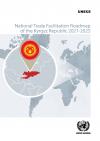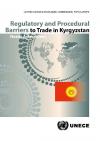Publications
Displaying Results 21 - 40 of 57
- English
This study summarizes the key findings of the ninth study, which focuses on Serbia. It was carried out pursuant to the Government’s request to support ongoing efforts to increase the trade sector’s contribution to development and the implementation of the 2030 sustainable development goals (SDGs). The study was prepared by the UNECE secretariat in close consultation with public and private-sector
- English
The National Trade Facilitation Roadmap of the Kyrgyz Republic 2021-2025 serves as the guiding framework for comprehensive national trade facilitation reforms over a five-year period. The Roadmap sets out a strategic vision and respective goals and activities for the Kyrgyz Republic to implement. Through these activities the Kyrgyz Republic can transform its trade facilitation services to
- English
Since 2010, the UNECE has been undertaking demand-driven national studies of regulatory and procedural barriers to trade, with a view to: helping countries achieve greater regional and global economic integration; informing donors as to where assistance might be required; and, supporting policy discussions within the Steering Committee on Trade Capacity and Standards (previously, the
- English
Gender Responsive Standards publication (ECE/TRADE/445) makes the case for mainstreaming gender in the development and implementation of standards. The first chapter places the discussion in the larger perspective of how standards contribute to the achievement of the Sustainable Development Goals of Agenda 2030. It reviews the role of
- English
This publication (ECE/TRADE/444) presents the results of an ongoing research on the practical experience of regulatory authorities, governments and local administrations, as well as regional groups of countries, in using standards towards sustainable development and the implementation of the 2030 Agenda.
The focus of the present volume
- English
Since 2010, the ECE has been undertaking demand-driven national studies of regulatory and procedural barriers to trade, with a view to: helping countries achieve greater regional and global economic integration; informing donors as to where assistance might be required; and supporting policy discussions within the Steering Committee on Trade Capacity and Standards (previously, the Committee on
- English
This Guide (ECE/TRADE/441) is a practical tool to help trainers in the preparation, delivery and follow up to a set of training workshops.
Both this guide and the workshop materials have been prepared by the UNECE Secretariat, with the support of subject matter experts as well as training experts. All training materials can be
- English
This Publication (ECE/TRADE/440) advocates for integrating education about standardization into the curricula of educational establishments. It presents evidence of the relevance of standards for policymakers and business executives as well as professionals. It then reviews the efforts of UNECE since 2012 to date to improve education about
- English
A small landlocked country, the Republic of Moldova remains one of the poorest countries in South East Europe, with the economy showing continued dependence on low value-added manufacturing and agriculture along with remittances from workers abroad for income generation. The country is yet to reap the benefits of the intensive reform efforts, which have been
- English
An upper-middle income country, Albania is in the process of implementing an all-encompassing reform effort to foster national competitiveness and achieve greater integration into global value chains.Driving these reforms is the imperative for fulfilling the requirements of the European Union (EU) Acquis Communautaire, which gained new life in 2014 when Albania
- English
The joint UNECE-OECD publication “International Regulatory Cooperation: the Case of the United Nations Economic Commission for Europe” presents the rule-making and standards-setting activities of UNECE.
It is illustrated by a number of examples that show how UNECE impacts our daily lives, including through:
- English
The aim of this bi-lingual Publication (ECE/TRADE/424) is to help bring voluntary standards into the toolbox of disaster risk reduction, including both by encouraging their use by business and by enhancing their role in regulatory practice and policy-making more generally. To this end, the paper
- English
Sixteen UNECE recommendations have been adopted by the Working Party since 1970 to address standardization and regulatory issues. They set out good practice regarding Regulatory cooperation, Metrology, Standards and Norms, Conformity assessment and Market surveillance.
Download the publication (ECE/TRADE/379/Rev.1) in
- English
This updated 2015 brochure (ECE/TRADE/415/Rev.1) provides information about the resources available, free of charge, from the United Nations Economic Commission for Europe (UNECE) that can be used to support Aid-for-Trade projects. The resources include international conventions, publications, standards and training materials, and
- English
Since 2010 the UNECE has been undertaking studies of regulatory and procedural barriers to trade in selected UNECE member countries with economies in transition, with a view to: assisting countries in their efforts to achieve greater regional and global economic integration; informing donors as to where assistance might be required; and, strengthening policy
- English
The continuous reductions in tariff and non-tariff barriers to trade and the rise of global supply chains have further increased the importance of trade as an engine of growth, creating new opportunities for investments, job creation and human development. However, for several countries, capitalising on these opportunities is
- English
This bilingual (English/Russian) publication (ECE/TRADE/418) presents the results of the International Conference on “Standards and Regulatory Systems”, held in Geneva on 19 November 2013 and organized by UNECE in cooperation with the Russian Union of
- English
This brochure (ECE/TRADE/415) provides information about the resources available, free of charge, from the United Nations Economic Commission for Europe (UNECE) that can be used to support Aid-for-Trade projects. The resources include international conventions, publications, standards and training materials, and are available to
- English
Assessing regulatory and procedural measures in trade: An Evaluation Methodology (ECE/TRADE/409) ......The Committee on Trade (CT) is a multilateral platform that brings representatives of governments from the 56 member States of the United Nations Economic Commission for Europe (UNECE) together with civil society organizations
- English
The Executive Committee (EXCOM) of the UNECE recommended at its thirty-fourth session in February 2010 that the Committee on Trade carry out three trade needs assessment studies in selected UNECE member countries and/or sub-regional groupings with economies in transition. These studies focus on procedural and regulatory barriers to trade in goods, with an eye to on-going development efforts in





















